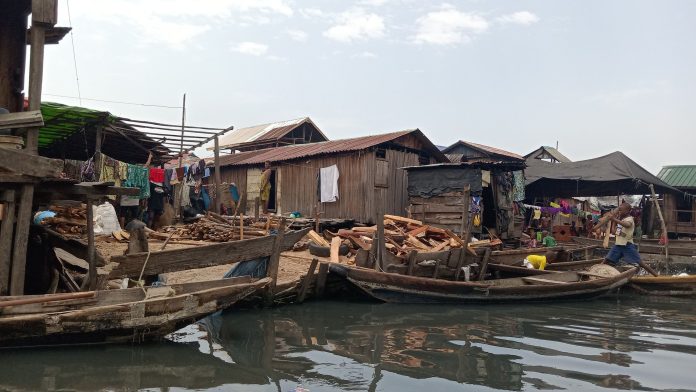By Boluwatife Adedokun
Fishing since he was six years old, Agba Moses is a middle-aged man whose eyes reflect a lifetime of unwavering adversity. His parents couldn’t afford to send him to school, forcing him into a career in fish farming in Makoko, a Lagos suburb.
Makoko, a run-down neighborhood, is home to many of Lagos’ fishermen, including Moses. This waterfront slum relies on fishing as its primary source of income, with homes built on stilts above the water.
Despite his unwavering efforts, Agba Moses’ journey has been far from simple. Each day, he wakes before dawn, enduring long hours and battling fluctuating market prices. Yet, his earnings barely suffice to feed his family.
“There is not much room for optimism given the severity of my circumstances and the weight of my responsibilities,” Moses said. “I am working hard, but I do not know where to put my fish. If the government can help us, it would be a big relief. I am currently concerned that my fish will spoil because we lack adequate storage facilities. I need a shop where I can safely keep my products.”
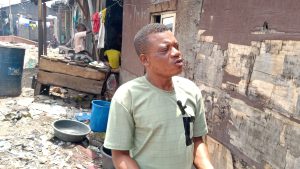
The inadequate storage facilities put Moses at risk of financial losses, worsening the already dire economic circumstances in the country.
The Fishing Village
Established in the 19th century, into a densely populated urban slum, Makoko was originally a fishing village that has grown within some decades. Its residents, who are primarily Egun fishermen from the neighbouring Badagry and Togo regions, relied on the Lagos Lagoon for their livelihoods. The community is divided into two parts: a land-based section and a larger section on stilts over the water.
Despite its rich cultural heritage, Makoko has long been neglected by the authorities: the residents build their homes from timber and stilts and are navigating the narrow canals with canoes. While this unique way of life has attracted the curiosity of many, the daily realities for the people of Makoko are far from idyllic.
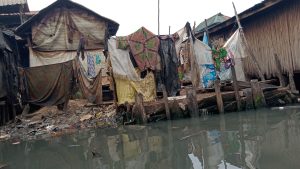
Hardships Prevalence
A recent report revealed the sad reality of the Makoko residents: a grim snapshot of life, with over 85,000 people living in the community without the means to access basic amenities.
According to a survey by the Lagos Government, nearly 75% of Makoko’s households lack access to clean water, and 90% do not have proper sanitation facilities. These unsanitary living conditions have given room for the high prevalence of malaria, cholera, and other waterborne diseases in the area.
Similarly, the World Health Organization (WHO) affirmed that Makoko residents are among the most vulnerable in Lagos State, with limited access to healthcare services.
The struggles faced by the people of Makoko are not isolated incidents but part of a broader narrative of hardship across Nigeria.
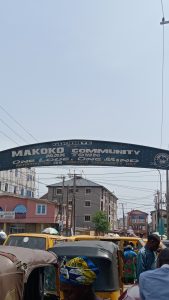
Fuel Subsidy Removal Despairs Livelihood
For communities like Makoko, where many residents rely on fuel for their fishing boats and daily activities, the subsidy removal has been devastating. Transportation costs have skyrocketed, making it more expensive to move goods to the market. This has snuggled to high prices of fish and other necessities, further squeezing the already tight budgets of Makoko’s residents.
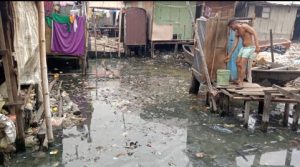
The economic pressures on Makoko’s residents have intensified in recent years. Inflation has driven up the prices of basic goods, making it harder for families to afford essentials like food, healthcare, and education.
According to the National Bureau of Statistics, in April 2024, the average price of 1kg of loose local rice was N1,399.34, marking a 155.93% year-on-year increase from N546.76 in April 2023 and a 3.47% rise from N1,340.74 in March 2024.
The price of 1kg of loose white garri rose by 134.98% year-on-year from N362.50 to N851.81, and by 13.59% from N749.89 in March 2024. Additionally, 1kg of tomatoes increased by 131.58% year-on-year from N485.10 to N1,123.41, and by 17.06% from N959.68 in March 2024.
The impact is acutely felt in Makoko, where many residents earn their livelihoods from small-scale fishing and trading. The rising cost of fuel has not only increased transportation fares but also the cost of fishing operations, leading to higher prices for consumers and lower profits for sellers.
Victoria EnikanOselu, a fish seller, shared her plight, akin to Moses’ tale: imploring for government support. “The fish is expensive, and we are not getting equal gains,” Victoria said.
“Every day, we struggle with high costs and low returns. We don’t wish to stay here, but we have no choice because there are no better opportunities elsewhere. It’s not convenient for us at all; the environment is harsh, and the lack of basic amenities makes our lives very difficult.”
Speaking to the Harbinger, Victoria’s words paint a bleak picture of the economic hardship faced by Makoko’s residents.
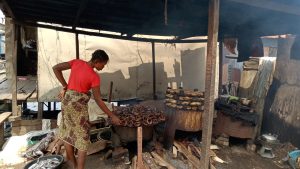
Living Conditions and Health Hazards
Improper sanitation facilities pose serious health risks, particularly in a community built on water.
The lack of proper drainage systems heightens the problem, making it difficult to combat malaria and other water-borne diseases. Residents are in desperate need of healthcare facilities and preventive measures to reduce the prevalence of illness in the community.
Tobi Agbabiaka, another resident of Makoko, highlighted the health hazards associated with living in Makoko. “This place always causes malaria for us, and we have no choice because we live amid water. The stagnant water is a breeding ground for mosquitoes, and many of us fall ill frequently. We need better living conditions, such as proper drainage systems and access to healthcare, to reduce the prevalence of malaria and other diseases.”
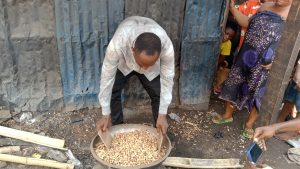
Taiwo Samuel, a 26-year-old resident of Makoko, explained the dire living conditions in the community. “There is no work here, and it’s tough to make ends meet. Each house has a toilet, but some people have to go to the river downstream because they can’t afford proper sanitation facilities,” he stated.
Education Is A Distant Dream
The struggles of Makoko are not limited to the fish sellers. Agbojobi Alafia, a French teacher at a private primary school in Makoko, narrated the infrastructural decay and challenges faced by educators in the community.
“Our school needs a lot of things like furniture, uniforms, and books. We struggle to provide the furniture ourselves, and we are just two teachers handling all the classes. The parents can’t pay much because they are poor. If the government can help us, it would make a big difference. We collect daily fees of 200 naira, while some can only pay 100 naira.”
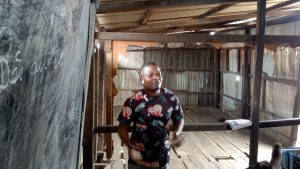
The lack of resources has turned education into a luxury that many in Makoko cannot afford.
“We can’t even call this a standard school because of the lack of resources. We teach everything in French, and the students speak French fluently. I wish they could become great people, but the greatest challenge is the lack of money to send them to school.” he said.
The 26-year-old resident of Makoko, Taiwo Samuel, added that there is no money for education, which means many children can’t go to school.
Call for Government Intervention
The residents of Makoko are not asking for luxury – they are asking for necessities; proper storage for their fish, better educational infrastructural development, improved sanitation, and healthcare. Their pleas are a stark reminder of the urgent need for government intervention.
Victoria EnikanOselu called for government intervention. “The government needs to step in and provide us with the necessary support to improve our living and working conditions. Without such support, the cycle of poverty and hardship in Makoko will continue unabated,” Victoria asserted.
“The government should help us. We have nowhere to go other than this place, and we have no money to send our children to school. We need more money to buy canoes because transportation is a major issue here. Without canoes, it’s difficult to move around, especially during the rainy season when the area gets flooded,” Omotosho Faidat, a mother of three, demanded.
Experts Weigh In
Folajimi Adebara, an educationist and development expert based in Oyo State, Nigeria, expressed deep concern about the challenges faced by the Makoko community.
“Lack of basic infrastructure will lead to poor education and a continuously failing society and cycle of poverty, which would keep the community poor. The government should simply invest in more infrastructure for the community,” Adebara told our Reporter.
Similarly, a seasoned Public Health Physician in clinical practice and program management, Dr Reinnet Awoh, sheds light on the pressing health issues facing Makoko residents: that the community’s reliance on contaminated lagoon water perpetuates waterborne diseases like cholera and typhoid, posing significant health risks to its inhabitants.
“Access to healthcare in Makoko is severely hindered by environmental barriers. Health facilities here often lack essential medicines, diagnostic equipment, and even clean water,” said Dr. Awoh. Additionally, the lack of facilities makes people more susceptible to the health crisis.
To address these issues head-on, Dr. Awoh recommends taking a multimodal approach. He underlined that “creating new centers and upgrading existing healthcare facilities are critical steps.” Furthering that, deploying mobile clinics can bridge gaps in accessibility, providing vital services such as vaccinations and maternal care directly to the community”.
And forming health committees and implementing education programs, can promote better hygiene practices and waste management. These initiatives will not only improve health outcomes but also foster a sense of ownership among Makoko’s residents.
Dr. Awoh added the importance of collaboration and sustainable financing from NGOs, government initiatives, and community-driven efforts, which can achieve significant health improvement for Makoko residents.


